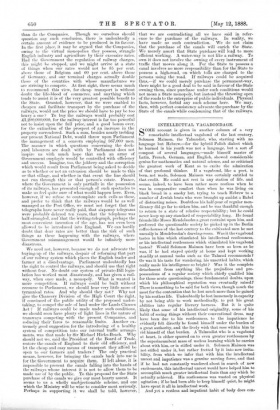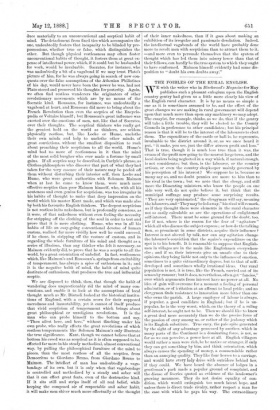INTELLECTUAL VAGABONDAGE.
SOME account is given in another column of a very remarkable intellectual vagabond of the last century, Solomon Maimon, the Talmudist, who, starting with no language but Hebrew,—for the hybrid Polish dialect which he learned in his youth was not a language, but a sort of compost of several languages,—made himself master of Latin, French, German, and English, showed considerable genius for mathematics and natural science, and so criticised the greatest work of Kant as to excite the admiration of that profound thinker. If a vagabond, like a poet, is born, not made, Solomon Maimon was certainly entitled to that credit. He could not rest in any station of life, and seems, indeed, to have been rather more restless when he was in comparative comfort than when he was living on black bread in a smoky hut, trying to teach Hebrew to a number of Jewish brats who were brought up amidst a Babel of distracting noises. Doubtless his half-year of regular men- dicancy did go far to sicken him, and he was thankful enough to return to a state of relative respectability ; but he could never keep up any standard of respectability long. He found friends like Moses Mendelssohn a great restraint upon him, and preferred the questionable society he picked up in the Berlin coffee-houses of the last century to the cultivated men he met uneasily in Mendelssohn's drawing-room. Was it the vagabond tastes in him which stimulated his intellectual restlessness, or his intellectual restlessness which stimulated his vagabond tastes ? Would Solomon Maimon have been as keen as he was, if he had stayed quietly at home and kept working steadily at manual tasks such as the Talmud recommends ? Or was it his taste for wandering, his unsettled habits, which really made his intelligence so bright ? Was it the complete detachment from anything like the prejudices and pre- possessions of a regular society which chiefly qualified him for those acute questionings, those fundamental doubts, upon which his philosophical reputation was eventually raised ? There is something to be said for both views, though much the most for the contention that he lost much more than he gained by his restless life. Undoubtedly he lost immensely in capacity by not being able to work methodically, to put his great abilities into regular literary harness. But it is quite likely that some of his intellectual originality, some of his habit of seeing things without their conventional dress, may have been due to his restlessness, to the impatience he evidently felt directly he found himself under the burden of a great authority, and the lively wish that rose within him to rid himself of that burden. A Talmudist who is a vagabond at heart, is either spurred on to even greater restlessness by the superincumbent mass of useless learning which he carries about with him, or is stifled under it. Solomon Maimon was not stifled under it, but rather fretted by it into new irrita- bility, from which we infer that with him the intellectual unrest and impatience was a genuine moving force, and that if he had not constantly wandered about in search of new excitements, this intellectual unrest would have helped him to accomplish much greater intellectual feats than any which he actually achieved. His restlessness was wasted on physical agitation ; if he had been able to keep himself quiet, he might have spent it all in intellectual work.
And yet a restless and impatient habit of body does con. duce materially to an unconventional and sceptical habit of mind. The detachment from fixed ties which accompanies the one, undoubtedly fosters that incapacity to be blinded by pre- possessions, whether true or false, which distinguishes the other. But though physical restlessness may often foster unconventional habits of thought, it fosters them at great ex- pense of intellectual power, which, if it could but be husbanded for work, would be invaluable. Socrates, for instance, who was undoubtedly a bit of a vagabond if we may treat Plato's picture of him, for he was always going in search of new con- quests over the false assumptions of the Athenian Philistines of his day, would never have been the power he was, had not Plato stored and preserved his thoughts for posterity. Again, we often find restless wanderers the originators of other revolutionary movements which are by no means of the Socratic kind. Rousseau, for instance, was undoubtedly a vagabond at heart, and Rousseau did more to bring about the French Revolution than even the sceptics of the Encyclo- pedia or Voltaire himself; but Rousseau's great influence was exerted over the emotions of men, not, like that of Socrates, over their thoughts. The sceptical thinkers who really get the greatest hold on the world as thinkers, are seldom physically restless, but, like Locke or Hume, unclothe their own minds and help to unclothe other minds, of great convictions, without the smallest disposition to rush about preaching their scepticism to all the world. Hume's mind had no more of restlessness in it than the mind of the most solid burgher who ever made a fortune by small gains. If all sceptics may be described, in Carlyle's phrase, as Clothes-philosophers who discover that part of what they had taken for the very essence of their nature may be peeled off them without disturbing their interior self, then Locke and Hume, who were great authorities with Solomon Maimon when at last he came to know them, were much more effective sceptics than poor Maimon himself, who, with all his acuteness and even genius for scepticism, was too irregular in his habits of thought to make that deep impression on the world which his master Kant made, and which was made also by both his favourite English thinkers. The deepest scepticism is not restless in its nakedness, but is profoundly conscious, as it were, of that nakedness without even feeling the necessity for stripping off the clothing of the soul in order to test and prove that it is mere clothing. Hume, who was in all his habits of life an easy-going conventional devotee of human custom, realised far more vividly, how well he could succeed, if he chose, in stripping off the vesture of custom, and in regarding the whole furniture of his mind and thought as a series of illusions, than any thinker who felt it necessary, as Maimon evidently did, to prove that he was a sceptic to all the world, by a great ostentation of unbelief. In fact, restlessness which, like Maimon's and Rousseau's, springs from excitability of temperament, has always a spice of enthusiasm in it; and it is the negative habit of mind, the habit of mind quite destitute of enthusiasm, that produces the true and influential sceptic.
We are disposed to think, then, that though the habit of wandering does unquestionably rid the mind of many con- ventions, and enable it to look at the assumptions of local thought much as Mr. Disraeli looked at the historical institu- tions of England, with a certain scorn for their supposed sacredness and immutability, yet it cannot of itself produce that vivid scepticism of temperament which brings about great philosophical or unreligious revolutions. It is the man who can probe himself to the bottom and say, "Thou ailest here, and here," without flinching under his own probe, who really effects the great revolutions of which restless temperaments like Solomon Maimon's only illustrate the true significance. Kant, though we cannot believe that at bottom his creed was as sceptical as it is often supposed to be, effected far more in his steady methodical, almost conventional way, by pulling the philosophical furniture of the mind to pieces, than the most restless of all the sceptics, from Democritus to Giordano Bruno, from Giordano Bruno to Maimon. The intellect of man has undoubtedly a vaga- bondage of its own, but it is only when that vagabondage is controlled and methodised by a steady and sober will that it can effect great feats, even of the destructive kind. If it sits still and strips itself of all real belief, while keeping the composed air of respectable and sober habit, it will make men shiver much more effectually at the thought of their inner nakedness, than if it goes about making an exhibition of its irregular and passionate desolation. Indeed, the intellectual vagabonds of the world have probably done more to revolt men with scepticism than to attract them to it, —and more even to persuade themselves that the system of thought which has led them into misery lower than that of their fellows, can hardly be the true system to which they ought to have conformed. Maimon himself evidently had some dis- position to "doubt his own doubts away."



































 Previous page
Previous page